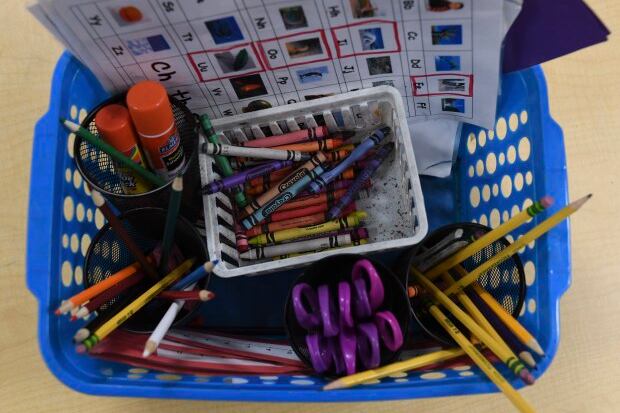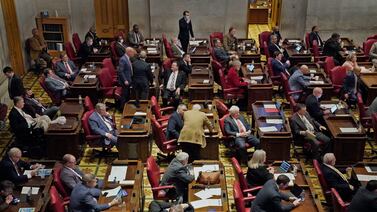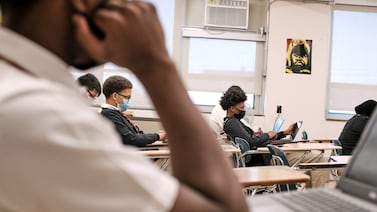In an extraordinary rebuke to Mayor Bill de Blasio, a New York City education panel early Thursday morning rejected a testing contract — halting, for now, the controversial practice of testing incoming kindergartners for admission to gifted programs.
With testing originally scheduled for this spring, it’s unclear how admissions to the city’s gifted and talented programs will move ahead.
The rejection was an unusual flex for a panel that has little formal authority, is mostly appointed by the mayor, and has acted largely as a rubber stamp for his education policies. Approval seemed like a forgone conclusion when Mayor Bill de Blasio announced earlier this month that the entrance test would continue for one more year. But that required the Panel for Educational Policy to approve an extension of the city’s contract with the company that provides the entrance exams, at a cost of $1.7 million.
Instead, the vote failed 8-7, despite City Hall’s intense lobbying behind the scenes and the appointment of a new panel member just a day earlier. The rejection came even after Deputy Mayor Dean Fuleihan appeared at the virtual meeting, promising future significant reforms to the gifted program. In the meantime, the city proposed several admissions tweaks aimed at creating more diversity for the incoming kindergarten class.
New York City is one of the only school districts in the nation that uses a test given to preschoolers to determine admission to elementary school gifted programs. Mayor de Blasio and Schools Chancellor Richard Carranza have both criticized the exam, but intended to use it this year while pursuing long-term changes.
“This is a very challenging topic. As a pedagogue, as a principal, as a parent, I can say with certainty that there is a better way to serve our learners than a test given to 4-year-olds,” Carranza said at Wednesday’s meeting. “That’s why we want this to be the last year this test is administered.”
Whether the city affords fair access to gifted programs has been hotly debated for years, and many advocates for reform hoped the ongoing coronavirus pandemic would finally force changes. Education department officials themselves warned this summer that moving forward with the test would likely widen disparities, as the effects of COVID-19 have fallen disproportionately on Black, Latino, and low-income communities. The admissions test is administered one-on-one in person, which also raises concerns about health and safety.
Panel chair Vanessa Leung took a strong stand against moving forward with the test for another year, pointing to rising COVID-19 rates in the city.
“Testing 4-year olds was never the right way — and most, if not all, experts would agree. And during a time of such risk and uncertainty, I cannot consciously support that this is a good use of the city’s money and time,” she said.
She also spoke passionately about the need for more integrated classrooms, rejecting that gifted programs serve Asian families well. (At 43%, the largest share of kindergartners in the program are Asian — many of whom come from immigrant and low-income families.)
“These arguments are steeped in white supremacy and anti-Blackness,” she said. “I need to center my decision on those most marginalized, and that includes so many Asian students who are struggling in survival mode.”
Panel member Gary Linnen appeared to be swayed by the outpouring of opposition coming from Community Education Councils, a district body of parent volunteers who weigh in on school issues. Their position, he said, “tells me that from the community’s perspective, that they’re not with it.” Linnen also pointed to testimony from a student with disabilities who advocated against approving the contract, saying “we’re doing a disservice,” to students who are “overlooked” by the current testing system.
The vote, which took place after midnight following three hours of public comment, leaves City Hall scrambling to determine how students will be admitted to roughly 2,500 gifted seats for incoming kindergartners.
“Earlier this month we announced a plan that laid out an equitable and long-term path forward for Gifted and Talented programs in New York City, without forcing a last minute-change for families during an already challenging time. We will share next steps with families soon,” education department spokesperson Katie O’Hanlon said in a statement.
Gifted programs have generated fierce debate, but ultimately serve a sliver of the school system. There are about 65,000 rising kindergarteners.
On Wednesday, a stream of parents, advocates, and students testified late into the night for and against continuing the entrance test.
Some argued that the programs are already diverse, given how many Asian students are enrolled. Others said the city should not cancel the test without having an alternative plan in place to fill seats in gifted programs.
“G&T might not be perfect but please, by all means, build a better equivalent and then dismantle what’s in place,” said Anna Biernat, the mother of a student in the program. “You are taking away an opportunity for students who are capable of learning at an accelerated speed.”
Others questioned the safety of administering an in-person exam while COVID-19 positivity rates hover around 9%, and given the cost involved at a time when many students still lack stable internet connections needed to participate in remote learning. They called for the city to focus its energy and resources on improving remote learning.
“There are more important needs in the school community,” said Rosa Diaz, a member of the parent education council in Harlem’s District 4. “I wish this money could be spent on providing students with better resources, even better breakfast and lunch for students to process learning better, and also to be spending money on reliable iPads that have internet.”
Addressing concerns about the cost of administering the admissions test even while schools see their budgets slashed, Fuleihan, the deputy mayor, pledged that the education department would not have to cover the estimated $5 million price tag — which includes the cost of the testing contract, staffing to proctor the exam, and protective gear such as masks.
In the end, it wasn’t enough to get the testing contract to the finish line.
De Blasio promised years ago to embark on listening sessions about the future of gifted programs in the city, but he largely sidestepped the issue until earlier this month, when he announced the admissions test would continue. More than a year ago, the School Diversity Advisory Committee, appointed by the mayor to recommend ways to boost school diversity, suggested phasing out the current program after a series of their own public hearings.
The mayor recently promised again to collect feedback, saying the city would spend the summer listening and have any changes in place by September.
Without a testing contract in place, education department officials may have to move much more quickly to come up with alternatives.
The nation’s largest school district could take cues from other cities, which rely on multiple measures for gifted admissions, such as scales and teacher observations. But most New York City programs begin at kindergarten, which could make such assessments hard to administer. Not all incoming students are enrolled in city preschool programs, and even those enrolled in pre-K may have vastly different experiences, attending either in person or online this year.
At a committee meeting on Monday, panel members repeatedly asked officials why the test couldn’t be administered remotely. Education department leaders said there isn’t much research on the reliability of virtual tests for such young children, that access to technology is uneven across the city, and that an online test would not be standardized, with the potential for parents to help their children.
Even while the school system has doubled-down on in-person testing for gifted programs, New York education leaders waived Regents high school exit exam requirements and will ask the federal government for permission to cancel state standardized exams for a second year in a row.








